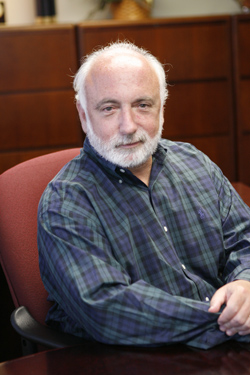|
“You can’t do the kind of work that I do without a team, as we are out in the field collecting data on very large samples and you need really good graduate students to do that kind of work,” Steinberg said. “I don’t think I could have done it without the particular graduate students I’ve had while I’ve been at Temple.”
Reflecting back on the one thing that stands out most to him during his three-plus decades of achievement, Steinberg said it is hard to beat having your work cited by the United States Supreme Court in a case as important as the juvenile death penalty.
“For someone who from the beginning of his career has been interested in trying to do the kind of research that is going to have an impact on policy and practice, having our research figure in a landmark decision is a pretty proud moment,” he said.
Alloy, an internationally renowned researcher in mood disorders, will receive the James McKeen Cattell Fellow Award, which recognizes Association for Psychological Science members for a lifetime of outstanding contributions to the area of applied psychological research. The award will be presented to Alloy and her collaborator, Lyn Abramson of the University of Wisconsin, at the APS annual convention in San Francisco next May.
Founded in 1988, APS is a nonprofit organization dedicated to the advancement of scientific psychology and its representation at the national and international level. Its mission is to promote, protect, and advance the interests of scientifically oriented psychology in research, application, teaching and the improvement of human welfare.
Alloy said that receiving the honor was special to her and Abramson because it was awarded for work in applied science and is coming from an organization that is focused on serving the needs and interests of science-oriented researchers and clinicians in psychology.
“Other awards that I’ve recently received were also lifetime achievement awards, but they were specifically from APA’s Division on Clinical Psychology,” said Alloy, who came to Temple from Northwestern University in 1989. “This award is coming from across all areas of psychology, and from an organization, APS, that I hold in the highest esteem.”
Alloy and Abramson have been collaborating on research into mood disorders, specifically depression and bipolar disorders or manic depression, since 1975. They are the authors of the “hopelessness theory of depression,” which they’ve tested quite a bit over the years.
“Maybe the single most important finding from that work is that we found that certain types of negative cognitive styles, or negative thinking patterns, make people vulnerable to first onset of depression and also to recurring episodes of depression,” she said. “It seems to be a pretty important risk factor.”
As an example, Alloy pointed out that when they looked at college freshmen who had never been depressed in their life, the researchers could predict with reasonable accuracy which students were going to develop a first onset of clinically significant depressive disorder based on their thinking patterns.
“For those who did suffer from depression before college, the risk factors could predict who was more likely to have repeated episodes,” she said.
Alloy said that winning this award is just another example of the world-class stature of Temple’s Psychology Department. “I’m fortunate to have such really fantastic colleagues and a lot of them have been honored with very prestigious awards too.”
“Many on our faculty are award-winning scholars and researchers, but these two awards are unique in that they are each for lifetime contributions to the field,” said Department Chair Marsha Weinraub. “We are very proud of all that Laurence Steinberg and Lauren Alloy have contributed to science and to the reputation of Temple’s Psychology Department as one of the premier places in the country for graduate work in both clinical psychology and developmental psychology.”
|

